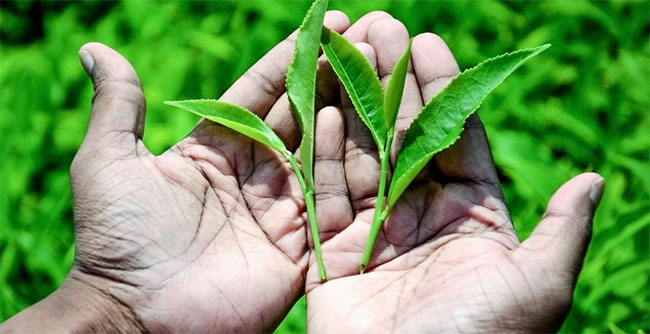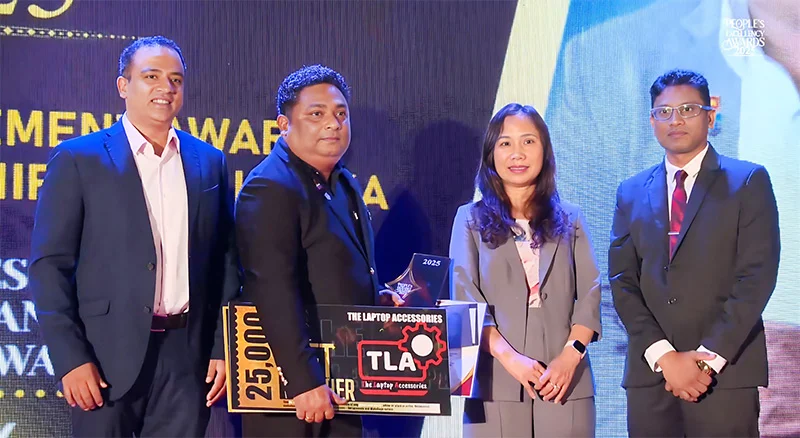Business
‘Colombo Tea Auction is the fairest platform for all stakeholders, including producers’

By Tea Exporters Association
The Question of the Auction
Tea has been sold by open auction in Colombo since July 1883, allowing participants to benefit from price discovery in a free and open market. This allows both producers and exporters to transact at the best and fairest price. The Colombo Tea Auction has long held the position of being the largest single-origin tea auction centre in the world. However, the present economic uncertainty in Sri Lanka has given rise and lent an air of authenticity to the false belief that, the benefits of rupee depreciation have not been fairly passed down to the producer. This is a view primarily held by a small group of tea producers and supported by certain policymakers.
This notion is, however, easily refuted by even a cursory examination of recent price trends at the Colombo Tea Auction. Industry experts understand that this is a misconception far removed from the truth. Nevertheless, this notion is gaining traction in certain quarters, with some with vested interests standing to benefit from interfering in what has been a free and fair market for over a hundred years. Therefore, in this article, we will examine this claim and recent trends witnessed at the Colombo Tea Auction, to factually and irrefutably quell any authenticity that these ill-conceived ideas attempt to claim before they have a chance to destroy one of the last remaining bastions of Sri Lanka’s already battered economy.
An Untenable Proposition
The solution proposed by a segment of producers is to change the value currency of the Colombo Tea Auction from LKR to USD. However, such a move will not work to better compensate producers. Such a move would introduce unnecessary and time-consuming red tape, not to mention volatility, into a system that functions very smoothly as it is. It also has the potential of further exacerbating the foreign exchange crisis, as the industry would need to “dollarize” itself, meaning that fewer dollars will be available for import requirements, as they will be in circulation within the local economy.
Furthermore, there is the question of the other members of the supply chain, for example, smallholder tea growers and transporters. What happens if they too demand that they must be paid in USD? Such circumstances would only exacerbate the foreign exchange crisis, as more and more participants demand to be paid only in USD. There will also be other foreseen and unforeseen macro-economic challenges, as a result of such a move, with part of the industry denominating its transactions in USD and other parts in LKR. Furthermore, dollarization may restrict exporters’ ability to pay the fair price at auction, leading to a potential negative impact on the price of tea.
Dollarization has been suggested before in Sri Lanka and has been decided against, for good reason. However, the present crises have lent a certain authenticity to these ideas, which must be refuted at once. Dollarization has been implemented in countries like Kenya, but the move only resulted in small and medium buyers being wiped out, and large multinationals taking control. Sri Lanka’s tea industry largely remains diverse, locally owned and controlled, and such proposed dollarization of the industry could potentially lead to a loss of ownership and control to a homogenous monopoly made up of large foreign companies.
Numbers Do Not Lie
Supported by the sharp depreciation of the LKR against the USD and a shortage of tea in Q1 2022, auction prices soared in the last two months providing, in some cases, even more than the full benefit of the exchange rate movement to the local tea producer and grower. For the first time in history, average tea auction prices for all three elevations exceeded LKR 1,000 per kg in April 2022. Accordingly, the average price of tea sold at auction rose from LKR 708.00 per kg in January 2022 to Rs. 1,324.95 per kg by May 2022, an increase of 88%. At the same time, the Rupee depreciated by only about 75% from LKR 203.00 to LKR 356.00 per dollar. This alone is sufficient to empirically prove and make the case that the present system of tea auctioning is serving both exporters and producers equally and fairly.
However, it is possible to further
demonstrate that the benefits are being passed down to the bottom of the supply chain if we consider the green leaf pricing formula. According to this formula, which is set and maintained by the Sri Lanka Tea Board, the apex governing authority for the industry, green leaf prices are set at a percentage of each factory’s tea sales average, computed based on monthly average tea auction prices. Thus, it is usually the practice that smallholders receive the price paid by the best factory in their area for their green leaf, sometimes even more. As a result, smallholder tea growers are now paid over LKR 200 per kg for green leaf, compared to Rs. 100/- 125/ per kg in the months before the rapid depreciation of the Rupee. These gains have also allowed many factories to provide increased compensation or relief packages to their staff, including labourers and other ancillary members of the supply chain.
Thus, teas are fetching prices far beyond fair value in many instances, giving a false impression that exporters are unfairly benefitting from the exchange rate volatility. The reality is, however, that the system of the open auction for tea in Sri Lanka, an established practice for over a century, is functioning well and exactly as it was designed to, fairly and openly distributing capital throughout the system, ensuring fair compensation to all members of the supply chain.
It is also necessary to bear in mind that tea exporters themselves have many costs over and above the tea itself. These include freight, packaging materials, tea flavours, agents’ commissions for foreign agents/distributors and marketing, all usually made in foreign currency, and none of these costs are passed on to growers or producers. With the present dollar shortage, most exporters are now required to make these payments in advance, even before receiving export proceeds, whereas these payments were made on credit terms in the past.
Understanding Reality & Gearing for the Future
Examining the figures and facts of the matter, it is impossible to draw any rational or reasonable conclusion other than that, the present system of tea auctions in Sri Lanka is working well and does not need any kind of meddling from any party, particularly policymakers. Much of the present economic disaster in Sri Lanka is a result of such meddling, so let us ask ourselves whether we would like to see one of the last remaining economic opportunities in Sri Lanka being destroyed for the benefit of a few.
If producers wish to benefit more than they already are from the currency depreciation, then Sri Lanka must look at increasing its annual tea production from 300 million kg to around 350 million kg, over the next 3 to 5 years, to meet global demand and benefit from increased revenues. This additional 50 million kg of produce could grow the nation’s export earnings by approximately USD 300 million each year.
Recent exchange rate movements have made Ceylon Tea and other products more attractive to overseas buyers and have even increased demand. However, Sri Lanka cannot benefit from this increased demand, without increasing production, and it certainly will not benefit in any way from parties with vested interests meddling with a system that has functioned well, created wealth and lifted generations out of poverty for over a century.
Business
Hemas posts resilient nine-month results

During the quarter, macroeconomic conditions reflected selective cost pressures alongside areas of stability, with a moderated net impact on the Group’s performance.
The Sri Lankan Rupee depreciated by 2.4%, driven by higher import-related foreign exchange outflows and cyclone-related economic disruption. This created some pressure on imported inputs, particularly in Consumer Brands and Healthcare, which was partially mitigated through pricing actions, procurement discipline and cost optimisation initiatives.
Monetary conditions tightened, with the Average Weighted Prime Lending Rate (AWPLR) rising by 89 basis points to 8.94%. The impact on the Group was contained due to its strong balance sheet, negative net gearing and disciplined funding strategy, limiting the effect on finance costs.
Inflation remained low at 2.1%, helping to contain operating cost escalation and preserve consumer affordability. In parallel, softer global palm oil and crude oil prices provided relief on input and energy costs, partially offsetting currency pressures.
In December 2025, the IMF approved US$ 206 million in emergency financing to support Sri Lanka’s cyclone recovery. Sovereign credit ratings were maintained during the period, supporting overall macro stability and business confidence.
Impact from Cyclone Ditwah
Cyclone Ditwah, which struck Sri Lanka on 25 November, was one of the most severe natural disasters experienced by the country in recent decades. The cyclone resulted in an estimated US$ 4.1 billion in direct economic damage—approximately 4% of national GDP—impacting homes, agriculture, infrastructure and livelihoods, with nearly two million people affected nationwide.
The Group’s manufacturing and service facilities did not sustain any direct physical damage, reflecting the effectiveness of proactive preparedness measures and robust business continuity frameworks across our operations. However, in the affected areas, the broader business ecosystems were significantly disrupted due to damage to personal assets, commercial premises, inventory losses, and disruptions to public transportation & logistics infrastructure, adversely impacting our employees, distributors and retail partners, including pharmacies.
These factors led to temporary supply-chain and distribution disruption during November and December, alongside a short-term deterioration in consumer sentiment. As a result, demand softness was observed during the latter part of the third quarter, particularly within the Consumer Brands and Healthcare sectors. Demand has since stabilised, with encouraging recovery trends evident, entering the fourth quarter.
In parallel, the Group mobilised a coordinated, multi-sector disaster response, working closely with government authorities, community organisations and local stakeholders. The Group committed approximately Rs. 30 million in financial and in-kind humanitarian assistance, focused on immediate relief for vulnerable communities. In addition, the Group has factored in Rs. 200 million for targeted support to small and medium enterprises across our value chain through extended credit terms, stock replenishment and business restoration initiatives. (Hemas)
Business
Aviyana Ceylon chairman Dr. Thisara Hewawasam wins 2025 People’s Award for Business Leadership

By Ifham Nizam
At a time when Sri Lanka is seeking to reposition itself as a premium tourism destination amid economic recovery and declining mass-market margins, Dr. Thisara Hewawasam, Chairman and Founder of Aviyana Ceylon, has been recognised with the 2025 People’s Award – Lifetime Achievement (VIP Category) for his contribution to business leadership and tourism-led economic transformation.
Dr. Hewawasam received the award at the 2025 People’s Awards ceremony held recently in Colombo, in recognition of his role in pioneering Sri Lanka’s first seven-star hotel project, Aviyana Ceylon, and for advancing globally competitive standards within the local hospitality sector.
The award was presented by Vietnam’s Ambassador to Sri Lanka Trinh Thi Tam, along with Parliamentarian Harshana Rajakaruna and Iconic Awards Director Asanka Athapattu, reflecting growing diplomatic and regional attention to Sri Lanka’s private-sector-driven growth narrative.
According to the official citation, the honour recognises Dr. Hewawasam’s leadership as a homegrown entrepreneur who translated long-term vision, discipline and innovation into a hospitality venture designed to compete at the highest international level. His work was acknowledged for strengthening Sri Lanka’s tourism brand while supporting national economic recovery through high-value investment, skills development and employment creation.
Crucially, the citation highlights that Dr. Hewawasam’s contribution extends beyond a single project. By positioning Aviyana Ceylon at the ultra-luxury end of the market, he has helped shift the national tourism conversation away from volume-led growth towards value-based tourism, a model increasingly viewed by policymakers as essential for improving foreign exchange earnings without overburdening infrastructure or natural ecosystems.
Industry analysts note that Sri Lanka’s tourism sector is at an inflection point, where attracting fewer but higher-spending visitors has become a strategic necessity. In this context, flagship developments such as Aviyana Ceylon are seen as confidence signals to international investors, demonstrating that locally led projects can meet global benchmarks in design, service quality and brand ambition.
The People’s Award—conferred only once in a recipient’s lifetime—serves as a public endorsement of leadership that delivers sustained national impact.
In recognising Dr. Hewawasam, the award highlights the growing role of domestic entrepreneurs in shaping Sri Lanka’s post-crisis growth model, particularly in sectors capable of delivering long-term foreign exchange stability.
Business
Corporate quarterly results continue to snag CSE vibrancy

The CSE commenced on a positive note yesterday but later the All Share Price Index slumped due to corporate quarterly results not reaching expected levels, market analysts said.
Amid those developments both indices indicated mixed reactions. The All Share Price Index went down by 103.17 points, while the S and P SL20 rose by 2.48 points. Turnover stood at Rs 3.55 billion with seven crossings.
Those crossings were: Tokyo Cement 2.58 million shares crossed to the tune of Rs 268 million; its shares traded at Rs 104, ACL Cables one million shares crossed for Rs 100 million; its shares traded at Rs 100, Cargills Ceylon 75000 shares crossed for Rs 54.7 million; its shares traded at Rs 730, LB Finance 302000 shares crossed for Rs 49.5 million; its shares traded at Rs 164, Tokyo Cement (Non-Voting) 570,000 shares crossed for 49 million and its shares traded at Rs 85.90, Seylan Bank 430,000 shares crossed for Rs 47 million; its shares sold at Rs 109.50 and HNB (Non-Voting) 70600 shares crossed for Rs 28 million; its shares traded at Rs 369.
In the retail market top seven companies that mainly contributed to the turnover were; Cargills Rs 206.6 million (283,000 shares traded), Renuka Agri Rs 153.5 million (9.6 million shares traded), ACL Cables Rs 148 million (1.45 million shares traded), Easter Merchants Rs 140 million (8.11 million shares traded), TJ Lanka Rs 109 million (2.8 million shares traded), Ceylon Land and Equity Rs 106 million (4.9 million shares traded) and Colombo Dockyard Rs 76.6 million (517,000 shares traded). During the day 158 million share volumes changed hands in 34681 transactions.
It is said that construction related companies and manufacturing and financial services related companies performed well. Top negative contributors to the ASPI were Senkadagala Finance (down Rs 68.50 at 837), Cargills (Ceylon) (down Rs 21 at 730), and Dialog Axiata (down 60 cents at Rs 32.70).
Yesterday the rupee was quoted at Rs 309.50/55 to the US dollar in the spot market, from Rs 309.43/50 the previous day, dealers said, while bond yields dropped significantly.
A bond maturing on 15.12.2029 was quoted at 9.45/55 percent.
A bond maturing on 15.03.2031 was quoted at 9.82/87 percent.
A bond maturing on 01.10.2032 was quoted at 10.15/20 percent, down from 10.17/21 percent.
A bond maturing on 01.06.2033 was quoted at 10.45/50 percent, down from 10.50/54 percent.
A bond maturing on 01.11.2033 was quoted at 10.60/62 percent.
A bond maturing on 15.06.2034 was quoted at 10.65/70 percent, down from 10.77/81 percent.
A bond maturing on 15.06.2035 was quoted at 10.72/75 percent, down from 10.95/98 percent.
An auction of Rs. 90,000 million Treasury bills is scheduled to take place today and an auction of Rs 51,000 million Treasury bonds tomorrow.
By Hiran H Senewiratne
-

 Features3 days ago
Features3 days agoMy experience in turning around the Merchant Bank of Sri Lanka (MBSL) – Episode 3
-

 Business4 days ago
Business4 days agoZone24x7 enters 2026 with strong momentum, reinforcing its role as an enterprise AI and automation partner
-

 Business3 days ago
Business3 days agoRemotely conducted Business Forum in Paris attracts reputed French companies
-

 Business3 days ago
Business3 days agoFour runs, a thousand dreams: How a small-town school bowled its way into the record books
-

 Business3 days ago
Business3 days agoComBank and Hayleys Mobility redefine sustainable mobility with flexible leasing solutions
-

 Business4 days ago
Business4 days agoHNB recognized among Top 10 Best Employers of 2025 at the EFC National Best Employer Awards
-

 Editorial6 days ago
Editorial6 days agoAll’s not well that ends well?
-

 Business4 days ago
Business4 days agoGREAT 2025–2030: Sri Lanka’s Green ambition meets a grid reality check













